
|

|
 |
|
|
An up close and personal interview with U.S. Police Veteran and Togetherweserved.com Member:
PTL Donald R Kricho (1959-1963)
Saint Louis Metropolitan Police Department
WHAT INFLUENCED YOUR DECISION TO MAKE A CAREER IN LAW ENFORCEMENT?
 Unlike many others, I had never previously dreamed of becoming a police officer. In fact, many who knew me previously found my decision hard to believe, since from childhood on I had always avoided any type of physical confrontation with others, which I thought resulted in a less than flattering reputation. When I was discharged from the Air Force, two of my closest friends who were St. Louis Police Officers encouraged me to apply. I suppose part of my reason for doing so was to demonstrate that I was actually capable of more than what my previous behavior had indicated. Unlike many others, I had never previously dreamed of becoming a police officer. In fact, many who knew me previously found my decision hard to believe, since from childhood on I had always avoided any type of physical confrontation with others, which I thought resulted in a less than flattering reputation. When I was discharged from the Air Force, two of my closest friends who were St. Louis Police Officers encouraged me to apply. I suppose part of my reason for doing so was to demonstrate that I was actually capable of more than what my previous behavior had indicated.
WHAT HAS BEEN YOUR CAREER PATH AND WHAT ARE YOU DOING NOW?
To this day, serving as a police officer was the greatest and most enjoyable activity in my life. My primary assignment was a one-man patrol car. At times I was also assigned to walking beats, two-man patrol cars, District Cruiser (patrol & prisoner transport), District Station Holdover, office duties, and Mobile Reserve assignments that saturated high crime areas with extra officers.
In my first assignment to Mobile Reserve, when I was still relatively new to the street, I was partnered with my best friend Bill Leahy. The Mobile Reserve Commander had a policy of  rewarding officers with a day off if they made arrests leading to conviction in crimes such as robbery, burglary and car theft. Bill and I did so well in making good arrests, we kept getting days off. So much so, I finally went our commander telling I much preferred more time on the streets. rewarding officers with a day off if they made arrests leading to conviction in crimes such as robbery, burglary and car theft. Bill and I did so well in making good arrests, we kept getting days off. So much so, I finally went our commander telling I much preferred more time on the streets.
When I left the force, one of the things I did was to become a security guard at the St. Louis Army Ammunition Plant. I quickly discovered that the 'Rent-a-Cop' duties and image did not provide the same amount of prestige and satisfaction as when I was a police officer. That prompted my going back to school where I earned a BS in Business Administration - Management, setting the stage for everything I've since accomplished in life. For almost 40 years, I functioned as an Industrial Safety Professional, which provided the basis for my current business.
DID YOU SERVE IN THE MILITARY PRIOR? AND IF SO, IN WHAT BRANCH OF SERVICE? IN WHAT WAYS HAS MILITARY SERVICE INFLUENCED YOUR CAREER IN LAW ENFORCEMENT?
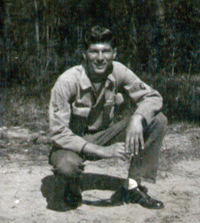 Prior to becoming a police officer, I served for 18 months in the U.S. Naval Air Reserve, including six months active duty to attend basic training and Aircraft Reciprocating Engines Technical School. The balance of the time was spent attending week-end drills. I then transferred from the Navy to the Air Force and served for 4 years as Jet Engine Mechanic. Being in the military made it much easier to transition into the world of law enforcement where many of the attributes are the same, such as discipline, teamwork and pride in service. Prior to becoming a police officer, I served for 18 months in the U.S. Naval Air Reserve, including six months active duty to attend basic training and Aircraft Reciprocating Engines Technical School. The balance of the time was spent attending week-end drills. I then transferred from the Navy to the Air Force and served for 4 years as Jet Engine Mechanic. Being in the military made it much easier to transition into the world of law enforcement where many of the attributes are the same, such as discipline, teamwork and pride in service.
I also maintain profiles on the Air Force and Navy Together We Served sites. I strongly encourage other current and former police officers with military experience to look into the benefits of membership in the appropriate military Together We Served site.
WHICH, OF THE AGENCIES OR DEPARTMENTS YOU WERE ASSIGNED TO, DO YOU HAVE THE FONDEST MEMORIES OF AND WHY?
My brief four-year career as a police officer was spent in St Louis' Fifth (Penrose) District. The Fifth was primarily a working-class neighborhood that was a magnet for migrants from the southeastern United States who came to work in the industrial plants. It was also home to more than its  fair share of armed robbers, burglars, car thieves and other malcontents that kept us busy and always on our toes. fair share of armed robbers, burglars, car thieves and other malcontents that kept us busy and always on our toes.
My fondest memories was being assigned to the same district and duty shift as my two close friends who talked me into joining the force. We were young and single, highly motivated and basically in love with what we were doing, which made us highly effective. We changed shifts every 3 weeks from days to afternoons to nights, but we all preferred working the afternoon (3pm to 11pm) shift, since that guaranteed the most activity. After the shift, we would change clothes and head to our favorite hangout after other guys had spent the evening purchasing adult beverages for the ladies that frequented the place. Think about it.
FROM YOUR ENTIRE LAW ENFORCEMENT CAREER WHAT PARTICULAR INCIDENT HAD THE BIGGEST IMPACT ON YOU AND WHY?
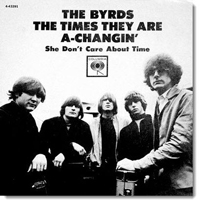 There was no single incident. Rather, it was the changes in society beginning in the early '60s, which ultimately became a consideration leading up to my decision and that of many others to abandon a career in law enforcement. It was becoming increasingly evident to many of us that the rights of criminals were being elevated above those of their victims. There was also the prevailing attitude of the courts that all criminals had a right and deserved rehabilitation over incarceration. But perhaps the most disturbing factor was the sudden and increased involvement of Internal Affairs (IA) monitoring our daily activities. While understanding that abusive police activities can never be tolerated, many of us believed that IA and those who gave them their orders were showing profound disrespect and distrust of the very people who had made a voluntary commitment to protect and serve their fellow citizens. There was no single incident. Rather, it was the changes in society beginning in the early '60s, which ultimately became a consideration leading up to my decision and that of many others to abandon a career in law enforcement. It was becoming increasingly evident to many of us that the rights of criminals were being elevated above those of their victims. There was also the prevailing attitude of the courts that all criminals had a right and deserved rehabilitation over incarceration. But perhaps the most disturbing factor was the sudden and increased involvement of Internal Affairs (IA) monitoring our daily activities. While understanding that abusive police activities can never be tolerated, many of us believed that IA and those who gave them their orders were showing profound disrespect and distrust of the very people who had made a voluntary commitment to protect and serve their fellow citizens.
OF THE MEDALS, AWARDS OR BADGES YOU RECEIVED, WHAT IS THE MOST MEANINGFUL TO YOU AND WHY?
I value my 1961 Commendation Letter. Not because of the arrests and resulting burglary clean-ups, but because of the recognition that I was beginning to become an effective street cop.
Probably everyone who graduated from a police academy tells a similar story about being assigned to ride with a 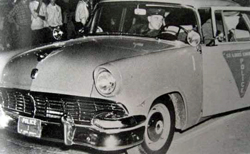 veteran officer, who promptly tells them to forget what they were told in the academy and to listen to him because he'll teach them what they need to know to become a good cop. In my case, I heard it from Patrolman Larry Hennessey. Nobody becomes effective overnight - it takes 4 or 5 years, I'm told. In this case, I was commended for identifying a fleeing burglar at night when it was too dark to see his face, just by the way he looked while running away from the scene. I subsequently went to his home and arrested him. It was Hennessey and others who began teaching me the art of observing my surroundings and mentally saving that knowledge for future use. Someone recognized that I was getting it. veteran officer, who promptly tells them to forget what they were told in the academy and to listen to him because he'll teach them what they need to know to become a good cop. In my case, I heard it from Patrolman Larry Hennessey. Nobody becomes effective overnight - it takes 4 or 5 years, I'm told. In this case, I was commended for identifying a fleeing burglar at night when it was too dark to see his face, just by the way he looked while running away from the scene. I subsequently went to his home and arrested him. It was Hennessey and others who began teaching me the art of observing my surroundings and mentally saving that knowledge for future use. Someone recognized that I was getting it.
WHICH INDIVIDUAL PERSON FROM YOUR CAREER MADE THE MOST POSITIVE INFLUENCE ON YOU AND WHY?
Bill Leahy. I've known Bill since we were in grade school. He's my life-long best friend. Bill began working as a switchboard operator in a St. Louis Police District Station several years before he finally entered the Police Academy. He and another close friend, Gene Robinson, were assigned to the  Fifth District. Fifth District.
When I was discharged from the Air Force, Bill and Gene encouraged me to apply for a police commission, and when I graduated from the Police Academy, were instrumental in helping me get assigned to the same District and work shift.
Bill was one of my police mentors. He helped me transition from a "rookie" Police Academy graduate into an effective street cop. He's a big guy who looks like he can handle himself in any type of a physical confrontation, although he rarely found it necessary to get physical. He had a way of talking that along with his imposing appearance, usually convinced people to see things his way. Just watching the way he worked on the street helped me to hone the skills required to turn otherwise explosive situations into routine events.
Bill has since taken the time to adapt the 'war stories' we used to tell about our activities in the Fifth District during the late 1950s and early 1960s. The result is a very readable book called "Curbstone Justice" that describes what it was like to be a street cop during that era.
WHAT DO YOU CONSIDER THE MOST IMPORTANT LESSON YOU HAVE LEARNED AS A LAW ENFORCEMENT OFFICER?
 "It Ain't Necessarily So." Your first exposure to an event may well cause you to jump to conclusions that upon further investigation prove to be completely wrong or offer a plausible alternate explanation. Of course, this is something every Law Enforcement Officer understands. For instance, the accompanying picture can be viewed as displaying two separate images. It takes some careful study to find its true meaning. But in today's 'Instant News' society every event is covered in minute detail by news media experts, pundits and other opinion-makers the moment it happens. And often much information and opinions are given long before all the facts are known, resulting in misinformation that causes more harm than good. A good police officer learns to separate what is real and not what is not even when there seems to be little difference. "It Ain't Necessarily So." Your first exposure to an event may well cause you to jump to conclusions that upon further investigation prove to be completely wrong or offer a plausible alternate explanation. Of course, this is something every Law Enforcement Officer understands. For instance, the accompanying picture can be viewed as displaying two separate images. It takes some careful study to find its true meaning. But in today's 'Instant News' society every event is covered in minute detail by news media experts, pundits and other opinion-makers the moment it happens. And often much information and opinions are given long before all the facts are known, resulting in misinformation that causes more harm than good. A good police officer learns to separate what is real and not what is not even when there seems to be little difference.
HOW HAS SERVING AS A LAW ENFORCEMENT OFFICER INFLUENCED THE WAY YOU CONDUCT YOUR PERSONAL LIFE AND YOUR RELATIONSHIPS WITH OTHERS OUTSIDE OF THE DEPARTMENT?
 Military service was the critical element that transformed me from a child into a responsible adult. It provided the organization, discipline and understanding of responsibility and sacrifice required to achieve objectives while working in harmony with others. Military service was the critical element that transformed me from a child into a responsible adult. It provided the organization, discipline and understanding of responsibility and sacrifice required to achieve objectives while working in harmony with others.
Serving as a police officer was an extension of the military training that helped to mold my outlook on life. In particular, exposure to the seamier side of life and observing the inevitable results of criminality emphasized the importance of living in accordance with a firm set of principles, a willingness to be held accountable for our actions, and doing the right thing when nobody's looking.
WHAT ADVICE WOULD YOU HAVE FOR A ROOKIE WHO HAS JUST PUT ON THE BADGE?
Pay close attention to the veteran officers who are assigned to begin the task of turning you into an effective law enforcement officer while helping you to avoid mistakes that could cause harm to you or others. It will take time for you to learn how to apply the knowledge that you acquired or will acquire in the Police Academy. Remember that your personal honor is worth more than any potential temptation to which you will be exposed.
IN WHAT WAYS DO YOU FEEL THIS WEBSITE CAN BENEFIT THE LAW ENFORCEMENT COMMUNITY?
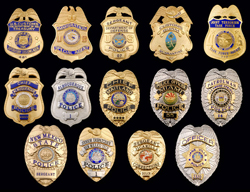 My association with 'new friends' on the Air Force Together We Served site has taught me that the common experiences, ambitions, and objectives that we shared during our service was not a fleeting, one-time thing. Rather, regardless of whether we were single-term or career veterans, or engaged in combat or peacetime activities, we formed a life-long bond with everyone who ever raised his/her hand and took a solemn oath to, ". . . support and defend the Constitution of the United States against all enemies, foreign and domestic; . . . ". I am very pleased to state that TWS has re-united me with the community that I left so very many years ago. Perhaps more importantly, I am reminded on a daily basis that others like I are willing to take a stand against those who are currently working to further degrade the Constitution. My association with 'new friends' on the Air Force Together We Served site has taught me that the common experiences, ambitions, and objectives that we shared during our service was not a fleeting, one-time thing. Rather, regardless of whether we were single-term or career veterans, or engaged in combat or peacetime activities, we formed a life-long bond with everyone who ever raised his/her hand and took a solemn oath to, ". . . support and defend the Constitution of the United States against all enemies, foreign and domestic; . . . ". I am very pleased to state that TWS has re-united me with the community that I left so very many years ago. Perhaps more importantly, I am reminded on a daily basis that others like I are willing to take a stand against those who are currently working to further degrade the Constitution.
|
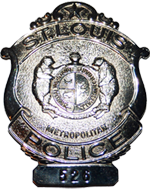
PTL Donald Kricho's Police
Badge Display Courtesy of

|
|
Share this Voices on:


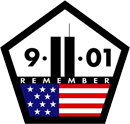

|
|
TWS VOICES
TWS Voices are the personal stories of men and women who currently serve, or who previously served as a US Police or Federal Officer, and conveys how serving their Country and Community has made a positive impact on their lives. If you would like your story to be featured in a future edition of Voices, or know someone else who may be interested, please contact TWS Voices HERE.
This edition of Police Voices was supported by:
Police.Togetherweserved.com
For all current serving and veteran Police Officers, Together We Served is a secure, feature rich website enabling Officers to reconnect with lost Brothers and Sisters, share in the camaraderie of other Officers, network for professional purposes and to honor the service of all.
To join Police.Togetherweserved.com, please click HERE.
| |